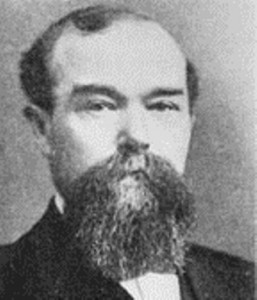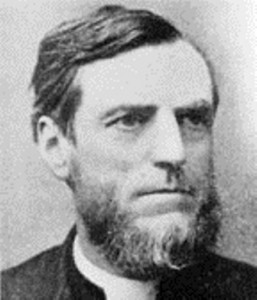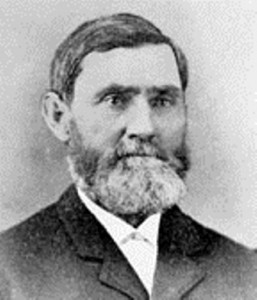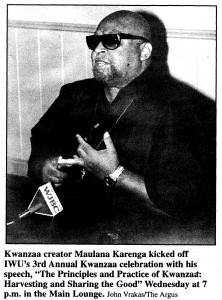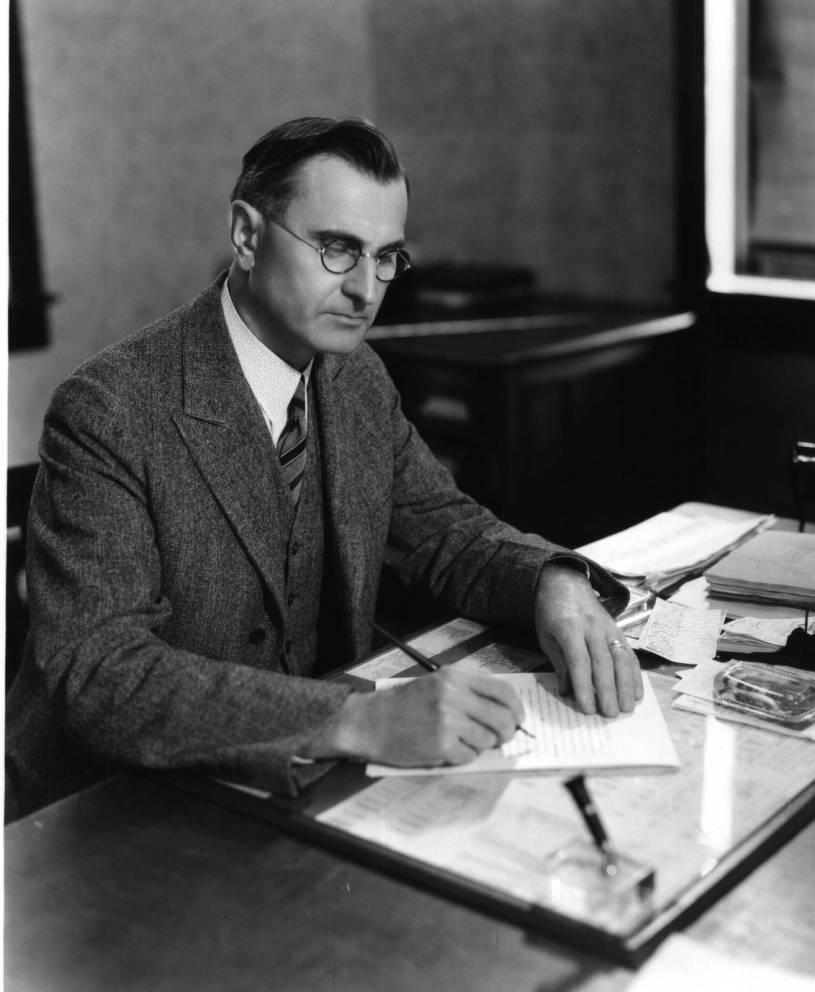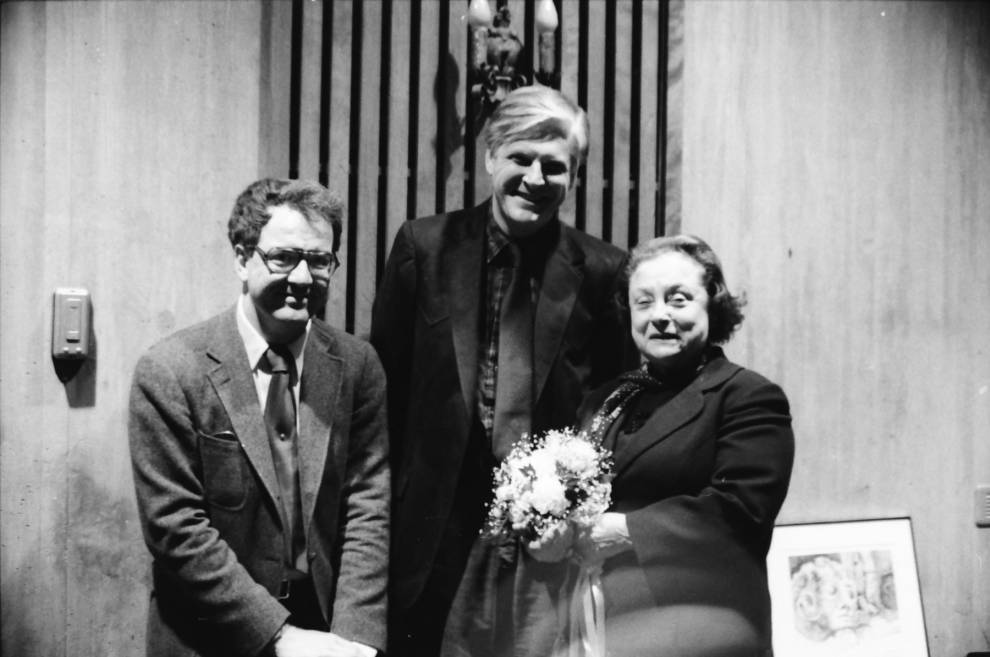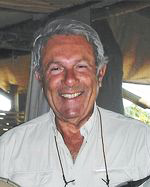Adams was president of Illinois Wesleyan from 1875-1888. He attended the preparatory department of Northwestern University and was licensed to preach by the age of 19, serving as a student pastor in Chicago. He enlisted in the Civil War in 1863 and within a year was elected lieutenant. Adams organized the first company of African Americans and was later promoted to captain and then to major. After resigning from the military, he went to study at Garrett Biblical Institute and graduated in 1870.
Presidential Biography: Samuel J. Fallows
Fallows was born in England and immigrated to Wisconsin with his family in 1848 where he joined the Methodist Church at the age of 19. He studied at Lawrence University in Appleton, Wisconsin and at the University of Wisconsin. He was the Vice-President and Principal of Galesville University for two years, joined the Union Army in 1862, and served as the chaplain for the 32nd Wisconsin Infantry. He was also a Professor-elect of Natural Sciences at Lawrence and later a superintendent. He became president of Illinois Wesleyan University in 1873.
In 1874 he established a non-resident degree program that awarded Ph.B, M.A., and Ph.D.’s to “professional men and women whose duties and environments are such as to make a resident course of study an impossibility.” (See pp. 38-39 of An historical sketch of the Illinois Wesleyan University, together with a record of alumni: 1857-1895). This was the first-ever distance education program in the United States and it ended in 1910.
IWU Black Fine Arts festival
In an Argus article published on October 18, 1968, the newly formed Black Students’ Association announced its purpose and goals. Among them were plans to hold a Black Fine Arts Festival (BFAF): “This festival would attempt to show blacks and whites the
quality and diversification of black artists.”
The first event BSA organized was called “Black Resurrection (Pure Suffering)” and received extensive coverage in the alumni publication called The Bulletin. Several photos of the evening’s performances are in the archives and available online. The Argus also contains a photo of the event.
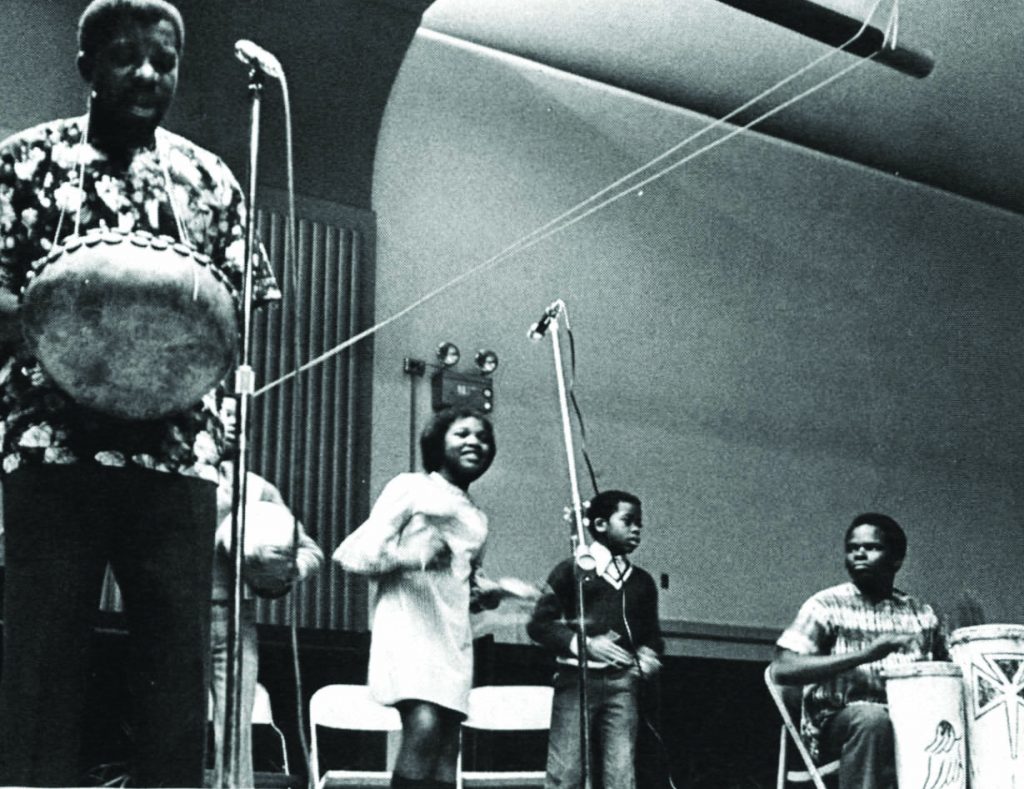
The first week-long event was announced in The Argus on December 3, 1971 and it took place Feb 6-12, 1971. The BFAF was held annually through 1981.
The photo shown here is of a performance by Ernest Kachingwe and his family. Kachingwe was the number one recording artist in Rhodesia, and the only African student at IWU at the time.
Presidential Biography: Oliver Spencer Munsell
Presidential Biography: Clinton W. Sears
Sears was the first official president of Illinois Wesleyan University and served from 1855 until 1857. He was born in New York in 1820 but spent most of his life in Ohio. He graduated from Wesleyan University in Connecticut in 1841. Before his presidency, he held the dual position of librarian and Professor of Ancient Languages and Literature.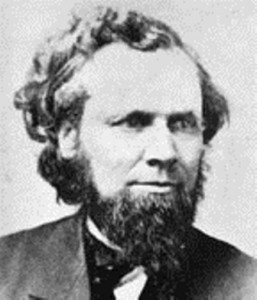
According to the 1998-99 President’s Report*, one notable contribution Sears made was ensuring there was a “‘substantial sidewalk’ linking the school and town. Sears noted that when it rained, the roads became so muddy it was impossible to get into town from the school ‘out in the country.’ In fact, he was so determined to connect Illinois Wesleyan with the growing community of Bloomington that he spent $500 of his own money to build the sidewalk.”
*Quoted from “Part 1-The Beginning,” One Building, One Sidewalk: 1850-2000, Past is Prologue. 1998-99 President’s Report, A Sesquicentennial Preview (p. 5). University Archives Record Group 5-2/7.
Research Files: Kwanzaa Events
Kwanzaa is a cultural holiday that celebrates African heritage. The very first campus Kwanza event at Illinois Wesleyan University was held on December 10th, 1996, thirty years after its creation. The event was run by the combined efforts of Monica Taylor, the multicultural affairs director at the time, and the Black Student Union, and is now an annual tradition.
Kwanzaa is a week long African American harvest celebration created in 1966 by Maulana Karenga, who was a professor of African studies at California State Univeristy. Illinois Wesleyan was fortunate enough to have Karenga visit its campus in 1998, where he presented his speech, “The Principles and Practice of Kwanzaa: Harvesting and Sharing the Good.” After this speech, Karenga and seven IWU students performed the ritual of the lighting of the Mishumaa.
“The mission of human life is to constantly bring good into the world.” – Maulana Karenga 1998
While the actual event occurs from December 26th until January 1st, IWU celebrates it in early December, so the students can celebrate it together on campus. The event includes singing, dancing, drum performances, as well as a feast of traditional Kwanzaa cuisine, such as catfish, chicken wings, black-eyed peas, and Joliffe rice. There is also a speech given about the seven principles of Kwanzaa; unity, self-determination, collective work and responsibility, cooperative economics, purpose, creativity, and faith. This celebration takes place every year and is free and open to the public.
Named places: McPherson Hall
McPherson Hall opened as IWU’s first modern production and instructional facility for Theatre on April 17, 1963. Prior to the Hall, a carriage house adjacent to Kemp Hall had been in use since 1949. This building is named for Harry W. McPherson, IWU President (1933-37), long-time Trustee and member of the Class of 1907. More information about him is available in his presidential blog post.
The Melba Johnson Kirkpatrick Laboratory Theatre and Jerome Mirza Theatre are part of the McPherson Theatre Arts department.
Kirkpatrick was a 1932 IWU graduate and headed the University’s Drama Department from 1938 to 1943. A champion of the arts in Bloomington for several decades, she received both the McLean County Women of Distinction Award and Illinois Wesleyan’s Distinguished Alumni Award.
The theatre in Illinois Wesleyan’s McPherson Hall was named the Jerome Mirza Theatre in recognition of a $2.5 million gift to the School of Theatre Arts (SoTA) from the Jerome Mirza Foundation in October 2015.
A 1960 graduate of Illinois Wesleyan, Mirza (1937-2007) was a well-known Bloomington and Chicago trial attorney, who often credited his courtroom success to the theatre training he received at Illinois Wesleyan. See the press release for more information.
Research Files: IWU’s Tigress-Slaying Alumnus
Guest post by Ashlyn Calhoun, Class of 2016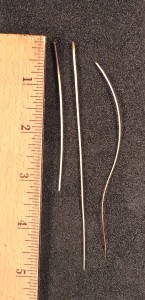
We have a lot of interesting things here at the Tate Archives and Special Collections in the Ames Library. We have old letterman jackets, the shovel used for almost every building’s groundbreaking since Presser, and an old student publication issue that included a packaged condom! Recently, we discovered what has got to be the most interesting Archival discovery of all time: the whiskers from a man-eating tigress slain by an alum during his time in India! How cool is that?
These tiger whiskers were folded into a letter written by 1907 Wesleyan alumnus Frank D. Campbell that was in his biographical file.
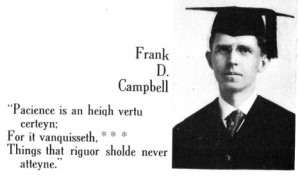 Campbell, his wife, and daughter lived and worked as missionaries in Jagdalpur, India for close to 20 years. Campbell’s daughter, Eleanor, told the tale of her father’s slaying of the tiger in a file obtained from the
Campbell, his wife, and daughter lived and worked as missionaries in Jagdalpur, India for close to 20 years. Campbell’s daughter, Eleanor, told the tale of her father’s slaying of the tiger in a file obtained from the
Illinois Great Rivers Conference Archives at MacMurray College. Eleanor told how her father, a Methodist minister, shot the tigress, who had killed over 150 people, after a Sunday church service!
If you’re interested in learning more about the Campbell family’s time in India or about the man-eating tigress herself, head up to Tate Archives & Special Collections on the fourth floor of Ames! We love the company!
Research Files: Sociology Department history
This post summarizes changes noted in the Sociology Department by examining the Catalogue of Courses. Course catalogs from 1851-1954 are available online; the rest are available in print in the University Archives.
The 1898-99 Course Catalog contains the name of the first faculty member affiliated with the discipline: “Sain Welty, M.A., LL.B., Political Science and Sociology.” (See his photo at https://bit.ly/2ZAbG13) A Non-resident M.A. in Sociology was awarded to Joseph Cookman Nate the same year.
The first course in sociology found in the 1899-1900 catalog is offered under Political Science. The same catalog provides a description of the course and its proposed frequency (pp. 54-55):
“A course in Sociology will be offered in the spring of 1900, and thereafter on alternate years with Economics (1). The course will necessarily be brief, Gidding’s text being used as a basis.”
Sociology continues with the same listing/requirements (“to be taken Senior year and then alternating years with economics”) in the following:
– 1900-1901 Under the direction of Oliver Lincoln Lyon, PhD, Instructor in Sociology and Economics and with a fuller description:
“The purpose in sociology is to trace the evolution of society from its primitive forms to its present state of complexity, to note the reciprocal adjustment of life and environment, to see how forces both subjective and objective have operated to bring about a normal state of society and to examine the forces which are now tending to change its structure.”
The catalog lists three courses: An Elementary Study of Social Principles and
Phenomena, The Principles of Sociology, and Seminary. The latter carries this description: “A study of such sociological problems as Organized Charity, Socialism, Communism, Crime, Urban Life and Social Selection, Negro, Immigrant, Sociological Study of the Family, Social Teaching and the Influence of Christianity.”
– 1905-06 Julius Christian Zeller, B.., A.M., B.D. is Professor of Philosophy and Sociology in the 1905-1909 catalogs.
In June 1906 James Robert Lincoln Diggs became the first African-American in the U.S. to earn a Ph.D. in Sociology. He graduated from IWU’s Non-Resident degree program. [More information about him is available in this post.]
– 1910-11 Course offered under Social Sciences and led by Ross Lee Finney, Ph.B., A.M., S.T.B., who also teaches in Education, Psychology and Religion.
– 1912-13 First time there is a Department of Social Sciences listed. There are courses as diverse as Economic Theory, Money and Banking, Railroad Transportation, Trusts and Monopolies, Problems of Labor, Social Theory and more.
– 1917-18
– 1919-20
– 1921-22 Listed as the Department of Economics and Social Sciences and led by Carl W. Strow, A.B., A.M. This is the first time a description is listed for the department:
“The general aim of the Department is to educate for enlightened citizenship, for alert membership in society, for socialization of the individual. Systematic courses seek to accomplish this end by providing accurate, scientific information concerning social conditions and by the inculcation of scientific social attitudes.”
– 1924-27 Frederic M. Thrasher, A.B., A.M., and two years of additional graduate work, continues as Professor of Economics and Sociology.
– 1926-27 Sociology has its own department, headed by Thrasher, and offers this description:
“The courses presented in the department of sociology deal with the interplay of human personalities and groups and the problems arising therefrom. They are designed to afford to the average college student a broad understanding of social life and of human nature in its related and interacting aspects. Qualified students may pursue a course in this department designed to prepare them for teaching social science in high school or college or for technical training in social work.”
– 1928-29 Professor Samuel C. Ratcliffe, A.B., A.M, Ph.D. listed as department head and by 1931 carries this description:
“The courses presented in the department of sociology deal with the relationships between persons and groups and with the problems which arise therefrom. Each course contributes toward a more adequate understanding of some phase of social life and thus
promotes a more intelligent citizenship. Students who plan to enter any phase of social welfare work, as a vocation, should major in this department.”
In 1933 Edelbert Rodgers became the first African-American to graduate from IWU’s residential program with a Sociology degree. More information about him is available in this post.
[Research into this department’s development ceased with this year.]
Research Files: IWU’s First International Students
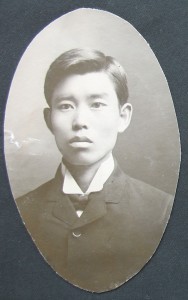
Photo scanned from a scrapbook held in IWU archives. The person is unidentified but the book includes named graduates from classes in the years after 1890.
In 1890, Wesleyan’s first two international students graduated from IWU’s Law School. Their names were Yeizo Osawa and Kashiyira Tanaka. They were from Tokyo, Japan, and were in residence on campus when they graduated. Stories in our student publications relate how they shared their culture with IWU’s campus, such as delivering lectures and describing some of the customs of Japan. Their presence among the graduation class of 1890 was even noted in local newspapers and in the Chicago Tribune.
Even earlier, other graduates with international addresses received degrees through our Non-residential program, meaning they did not have to attend classes on our campus. This program is described the following way in an 1895 publication:
The object of this step was to furnish lines of systematic study for those professional men and women whose duties and environments are such as to make a resident course of study an impossibility, and yet who earnestly desire systematic study.
Sounds a lot like what online learning programs promise today, doesn’t it?
An early graduate of the program with an international address is Rev. John Oakly Spencer of Japan, who graduated with a Ph.B in 1888. One wonders about the possibility of Osawa and Tanaka meeting Oakly and finding out about our small school in Central Illinois!
Other Non-resident graduates living abroad in the same time period were Rev. Myron Chesterfield Wilcox of China who also graduated with a Ph.B in 1886, and William Groves of Uruguay who graduated with an M.A. in 1897. William C. Armstrong and Frederick W. A.Meyer, of Ontario, Canada and Arthur Thomas Carr of Birmingham England all received M.A. in 1896.
These men were not international students in the same way we think of today, but they demonstrate our current philosophy has long-standing roots: bring the world to Wesleyan and Wesleyan to the world!
To learn more you can visit Tate Archives and Special Collections in the Ames Library or contact us at archives@iwu.edu!

